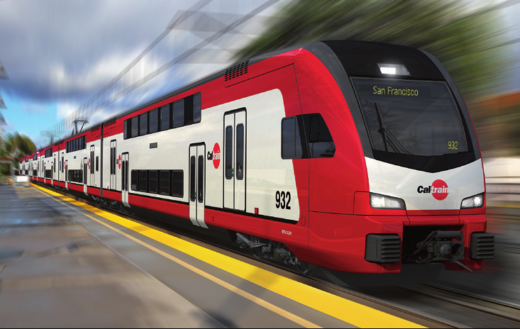"This project really is one of the biggest local priorities for this very important business community, which drives innovation across the entire country," said O'Connor.
The mayors of San Jose, Palo Alto and Sunnyvale, along with other local elected officials, will join the lobbying effort, which grows out of a partisan political fight over California's high-speed rail system.
Last month, the 14 Republicans in California's delegation to the House of Representatives sent a letter to new Transportation Secretary Elaine Chao urging her to block any further funding of California high-speed rail. That would include the $647 million federal share of the Caltrain electrification work.
"We think providing additional funding at this time to the authority would be an irresponsible use of taxpayer dollars," the letter said. It called for no further funds to be granted until "a full and complete audit of the project and its finances can be conducted."
That letter drew a rebuttal from California's Democratic congressional delegation, including Sens. Dianne Feinstein and Kamala Harris. They said the GOP contingent's demand would kill a project that, while it could be used by bullet trains in the future, is separate from the high-speed rail project.
That point was hammered home in a Feb. 3 letter defending the project.
"Rail service has operated on this corridor for over 150 years and for decades Caltrain has sought to electrify this line to replace aging diesel engines," the Democrats' letter stated.
Chao delayed the funding decision, as the Republicans requested, with the Federal Transit Administration issuing a statement Feb. 17 that said it was "deferring a decision" on the modernization funds "to be considered in conjunction with the development of the president's" budget.
Caltrain's $1.9 billion modernization project will allow the transit agency to switch from diesel-hauled engines to faster, quieter and more efficient electric trains by 2021. It will help boost the system's ridership by about 70 percent by 2040.
"This is a really important project for the Bay Area at an important time when our region, and especially the part of the region that delivers over half the gross domestic product of the overall Bay Area, the 101 corridor, is experiencing terrible, terrible congestion," said Jim Wunderman, president of the Bay Area Council.
The electrification project was scheduled to begin construction Wednesday. On Monday, Caltrain officials announced that they were able to renegotiate the project's schedule with contractors, getting an extension until June 30. Not only is the delay a setback, but it will tack on a cost of $20 million.
Seamus Murphy, Caltrain's communications director, said the new timeline will allow the Trump administration time to make its decision.
"We think it will be approved and we'll be able to move this project forward," Murphy told KQED's Forum last Friday. "If we aren't able to do that for some reason, we would need to think about alternative sources of funding and we would have that conversation when the time is appropriate."
Murphy said one factor that weighs in favor of the project is that it would create 9,600 jobs in 15 states. The transit agency has launched a petition that urges the president to give the green light.
Though Trump hasn't publicly laid out a transportation agenda, he has hinted that his infrastructure goals would include high-speed rail. But there have been reports that the administration may take a page from a proposal by the conservative Heritage Foundation and gut transit funding.
Wunderman of the Bay Area Council said he has had conversations with House Republican Majority Leader Kevin McCarthy of Bakersfield, who agreed Caltrain electrification is a "viable and valued project," but opposes it because of its ties to high-speed rail.
O'Connor said previous threats to cut federal transit funding have split the Republican caucus because "many Republican elected leaders have served as mayors and supervisors before joining Congress and realize how important it is to have federal investment in transportation infrastructure."
The delegation, which is seeking a meeting with Transportation Secretary Chao, plans to make it clear to both Republicans and Democrats how important the Caltrain electrification funding is to Silicon Valley and in promoting new economic corridors and facilitating commerce, said O'Connor.
"We do think it's a very strong argument with many Republicans who don't agree with the Heritage Foundation's recommendations precisely," he said.
